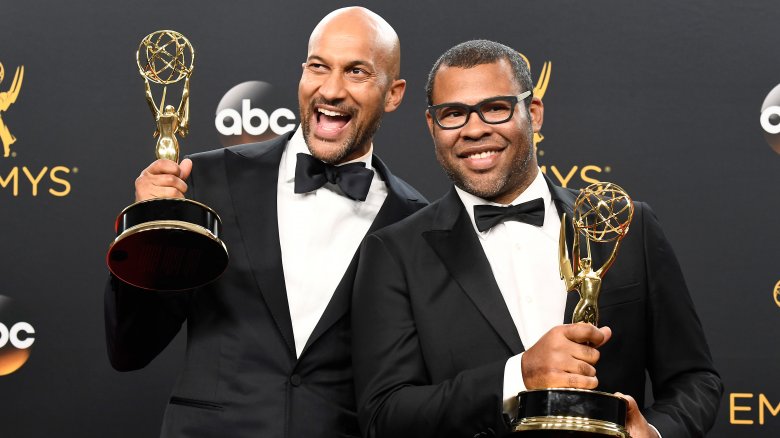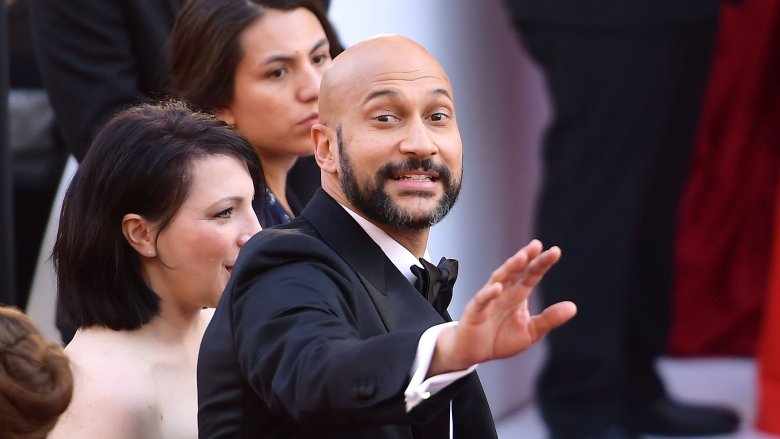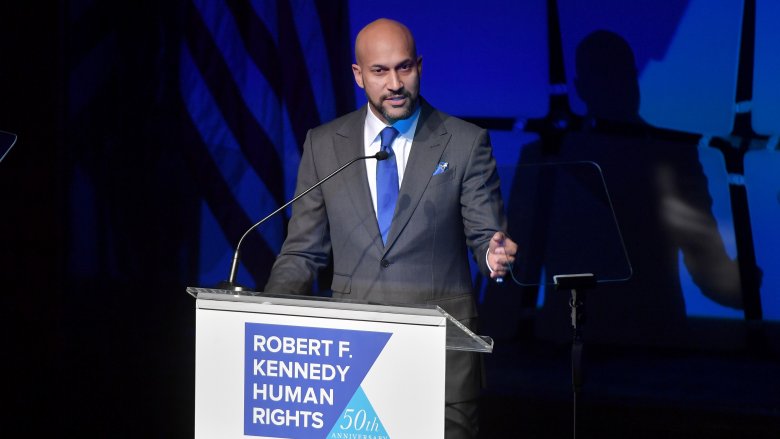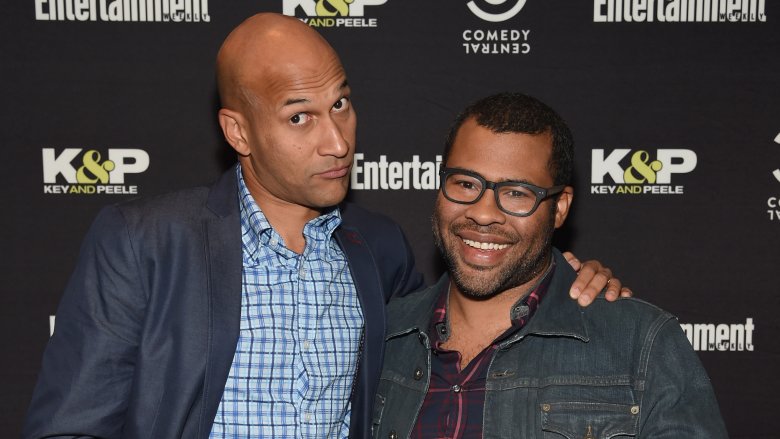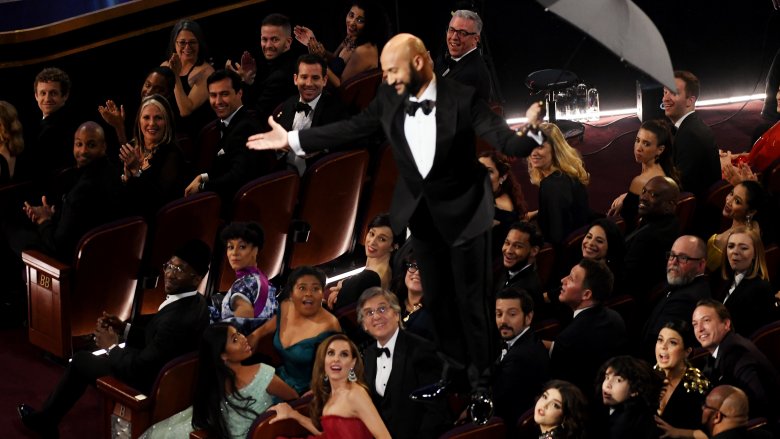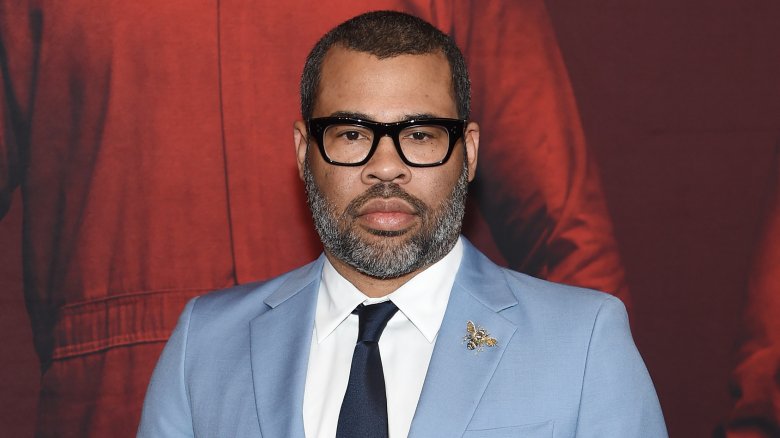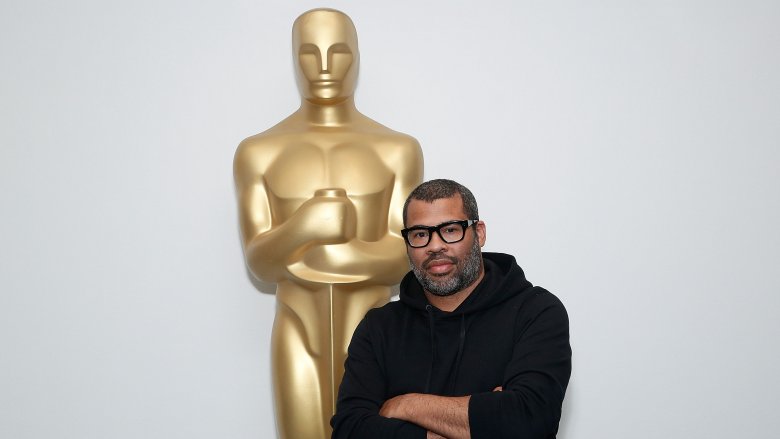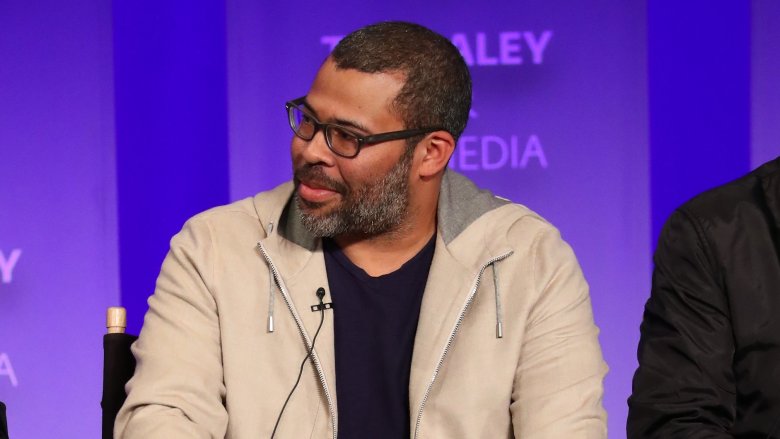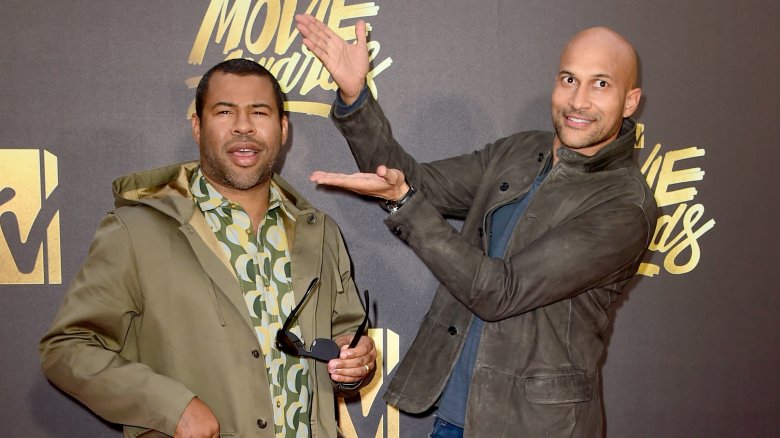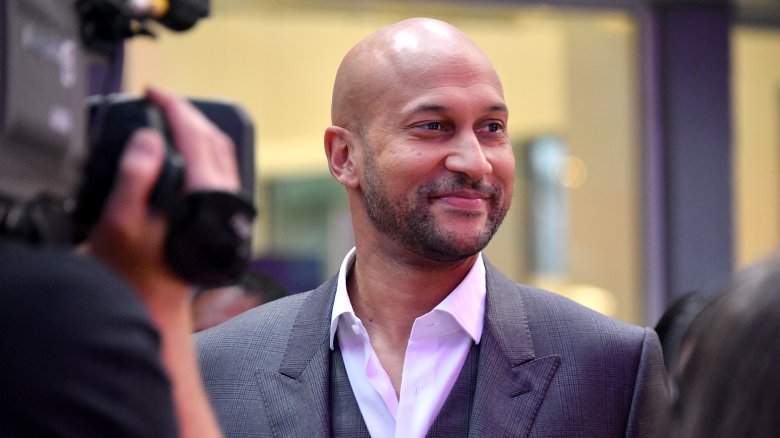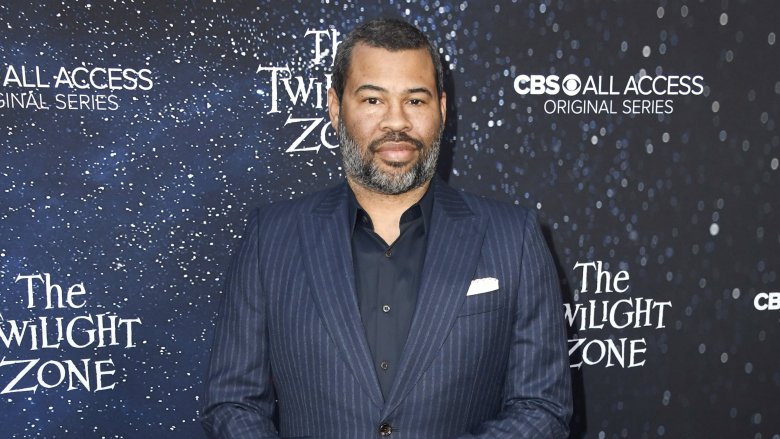What Key And Peele Were Like Before The Fame
Keegan-Michael Key and Jordan Peele have taken over the world. Their sketch show broke new ground in the world of socially-minded comedy and regularly went viral. Literally thousands of people go through life now, seeing the name "Aaron" and pronouncing it "Ay-ay-ron." President Obama himself is enough of a fan that he got in touch to bring Luther, Key's portrayal of his "anger translator," to the White House Correspondents' Dinner. Today, the entire world is rushing to be terrified by Jordan Peele's work as a director of horror films, the newest of which, Us, is already breaking box office records.
But no one is born at the top. What made this audacious twosome the brilliant, bawdy, brash men they are today? Who made them laugh? Who made them cry? There's no better way to appreciate your heroes than studying how they got to be so heroic, so today we present a collection of facts about Key and Peele before they were, well, Key and Peele — childhood nerdery, puppetry, and long-lost half-brothers included.
Key was adopted — and has a famous half-brother
Key was born in Detroit, the result of an extramarital affair between his mother and his married father. He was given up for adoption and taken in by another Michigan couple, a pair of social workers who happened to share the biracial nature of his background. Though later family turmoil ensued — his parents divorced, and his father later remarried a woman from Northern Ireland — his family ties remained strong and, like Peele, he is notably close to his mother.
This unique upbringing is notable on its own. Things got even more interesting, however, when Key explored his family tree to learn more about those to whom he's related by blood. It turns out that he had a half-brother after all — and that half-brother was famous in an entirely different industry and creative medium. Key's half-brother was the late Dwayne McDuffie, founder of Milestone Media, writer on Justice League Unlimited, and creator of superhero luminaries including Static Shock, among other works. McDuffie is widely regarded as one of the most important comic figures of the past century — there's an award named after him and everything — and the sad fact of the two brothers never knowing each other cuts deep, in addition to the loss of McDuffie's talent. One thing's clear, however: that's one brilliant family.
Key was a Phi Kappa Theta brother
Though Peele is the one most known as a nerd, both Key and Peele cultivate a certain air of misfithood. Their comedy relies on the strange and uncomfortable — the realities society doesn't like to discuss, the hierarchies that hide in plain sight, the just plain odd. They find humor in juxtaposing proper church ladies against literal Satanic forces, the unspoken connection between black people in white spaces, and men who want to be cool, but only where their wives can't see. It's all about what's underneath, what's marginalized, what's silent until you give it a voice. Peele has gone ahead and turned that into some of the greatest horror fiction of the decade.
So it might surprise you to learn that Key is that most lauded of men: a fraternity brother. While at the University of Detroit Mercy, he was a member of Phi Kappa Theta, where his brothers encouraged his aspirations. "I remember a brother taking the time to sit down and talk with me about what I wanted to do in college," Key recalled in 2013. "I felt that he made an earnest connection with me. To me, that's brotherhood." It is indeed, and he's stayed in touch with the organization ever since.
Both worked for years as lesser-known comedians
Success is a journey. You decide where you want to go, you take the first step... and for most people, you try a lot of things that may or may not work out. But it's not as simple as triumphing or failing at everything you try. Every experience, especially in the world of the performing arts, is a moment from which many lessons can be drawn.
Key and Peele are no exception. Before their show took off, before their skits went viral, before Peele was winning Oscars and Key was performing with President Obama, they were comedians on the way up. Key was a member of Second City Detroit while Peele performed with Second City Chicago. They met in 2003 as part of MadTV, where they discovered their comic chemistry and, as they told Jimmy Kimmel, "fell in comedy love." Thankfully for all of us, they decided to work together, using the lessons they'd learned as part of other operations to create lasting laughs.
Key was a panelist on Wait Wait... Don't Tell Me!
Life is full of unexpected detours. Albert Einstein was a brilliant physicist who changed the world forever, but for a while, he worked in a patent office. This isn't failure, but life itself — all the bizarre little curveballs, whims, and accidents that make up the tapestry of a human's time on earth. Key, for example, was once a panelist on NPR's Wait Wait... Don't Tell Me!, a beloved quiz show where guests can end up getting asked about pretty much anything.
Key, in a particularly wry twist, was tested on his knowledge of peels. Not his partner Jordan Peele; we're talking everything but. The Peel P50 car. British politician Sir Robert Peel. DJ John Peel. He got two out of three questions right, which (as the hosts dictated) made him a winner, as they're "very forgiving." Hopefully he'll get to make another appearance someday and sweep all three.
Peele attended progressive NYC schools
Our school days shape us. Geeks carry the social ostracism they endured into adulthood and end up making Stranger Things and The Matrix. Katherine Hepburn was encouraged to pursue her dreams and became one of the greatest actresses of all time. How we learn, where we learn, and who teaches us are experiences we carry into the rest of our lives, for good or for ill. It's why education is such a hot-button issue — it matters about as much as anything can.
Jordan Peele is an apparently positive example of this. His childhood was spent in progressive New York City schools, most prominently the Computer School and the Calhoun School. The latter in particular has an impressive history of forward-thinking ideals — founder Laura Jacobi was an early supporter of civil reform, women's rights, and community health — and it's clear these attitudes went on to influence Peele. Would he have had the confidence to go into comedy without such mentorship? Would the social critique found in his movies be as pointed and sharp? We'll never know, but it seems fair to suspect that his schooling played a part.
Peele is a college dropout — and a student of puppetry
The greatest artists often have the most unconventional histories. Recall Abraham Lincoln, born in a log cabin, who would end his days as a great statesman, scholar, and leader of men; or Hypatia of Alexandria, who managed to be a woman of science in a time and place that very much did not encourage her down that path. More still have fascinating, incongruous escapades in their past that inform who they went on to become in ways no one could have planned or predicted. After all, Isaac Newton didn't plan on getting bonked with that apple.
So it goes with Jordan Peele. He's already proven himself to contain multitudes, from his boundary-breaking horror to his unabashed nerdery, but would you ever have guessed that he has a background in puppetry? Or that he dropped out of Sarah Lawrence College after two years? Or that the two things are somehow connected?
It's true. Peele spent two years at Sarah Lawrence studying, in part, the art of puppeteering. Though he did not ultimately follow that path, in a loose sense, he braided those skills into his current career. At least, that's how he sees it, saying he thinks of himself as "the most intricate puppet of all."
Peele unsuccessfully auditioned to be SNL's Obama
Once success has been achieved, it's easy to lose sight of what it took to get there. We don't talk about the toes lost to frostbite on the way up the mountain — we just want to remember the glorious view at the summit. It all came out all right in the end, and who wants to spend time dwelling on failures anyway? Never mind the fact that everyone has them — even the director currently on top of the world.
Peele, like any artist, incurred his share of loss over the course of his upward climb to the peak he currently occupies. Most prominent is his audition to play President Obama on Saturday Night Live. Funnily enough, he went on to become famous in part because of his pitch-perfect portrayal of the calm, professorial president, especially when performing alongside Key as Luther, Obama's "anger translator." But SNL didn't see what millions of fans would go on to acclaim, and the part passed to Fred Armisen. It just goes to show: no matter how many times you stumble in the snow, you'll make it to the top of the mountain if you just keep going.
They spent a lot of time on other people's shows
We've established that both Key and Peele spent time as part of smaller operations like the Second City and outright failing to secure certain plum parts before they rocketed to the top of the heap. But beyond these obvious stumbles and successes lies a fascinating grey area: all the things they did that worked out without making them huge. It's an essential part of any performer's career. You learn how to work with people, how to roll with the figurative (or literal, when it comes to stage combat) punches, you figure out what you'd like to do if you were in charge. It's one of the most important, least discussed periods for any artist.
Key and Peele actually worked together on one such project, when they were both part of Weird Al Yankovic's "White and Nerdy" video. In addition, Peele was part of the Adult Swim series Childrens Hospital, the first season of Fargo, and David Wain's Wanderlust. Key was in several episodes of Reno 911!, Playing House, and Whose Line Is It Anyway? Now that they've roundly succeeded, one might think they'd put such experimentation behind. Not so: Key played Horatio in a New York Public Theater production of Hamlet in 2017, and Peele is hosting a new iteration of The Twilight Zone on CBS All Access.
Key suffered from childhood epilepsy
Both Key and Peele's interests in performing and the arts developed early. But there were other ambitions as well, and certain avenues that had to remain unexplored. This describes anyone's life, of course, but not everyone has to leave certain stones unturned due to childhood illness. This was the case for Key, who was unable to explore athletics in any kind of serious manner due to childhood epilepsy. He was particularly interested in football (among other possible passions, including veterinary science) but his parents, understanding that his affliction would make that impossible, steered him towards acting.
At the time, this must have been crushing. Any child's first encounter with the unpleasant and immovable nature of life, let alone chronic illness, is frustrating. Happily, though, the condition no longer holds him back, and acting certainly worked out in the end. Turns out his parents were onto something.
Peele has been a huge nerd since childhood
It hardly needs to be said at this point, but just in case you haven't noticed the superhero movies, Star Wars merchandise, and big-budget adaptations of anime that currently flood our world, nerds are having a bit of a moment. Anyone can be an unabashed nerd — Pulitzer Prize winner Lin-Manuel Miranda likes to talk up his favorite comics when he isn't starring in Disney movies. And it's not just their favorite media that's taking up every screen right now — many of our beloved fictional heroes and villains are, themselves, nerds. Peter Parker spends his off-time building Lego models of the Death Star, while Kylo Ren is himself an obsessive Darth Vader fanboy.
Jordan Peele is no exception. A recent Rolling Stone interview took place as he and the reporter walked through Universal Studios' Wizarding World of Harry Potter park. He references obscurities like Tales from the Crypt Presents: Demon Knight with ease. His love of genre isn't anything he's tried to hide — see his current hosting of legendary sci-fi property The Twilight Zone — but it's fascinating to see just how deeply his geekdom is embedded. He's been into the weird, the bizarre, the horrible, and the fantastic, from a very early age. How lucky are we to get to see that all come to fruition?
